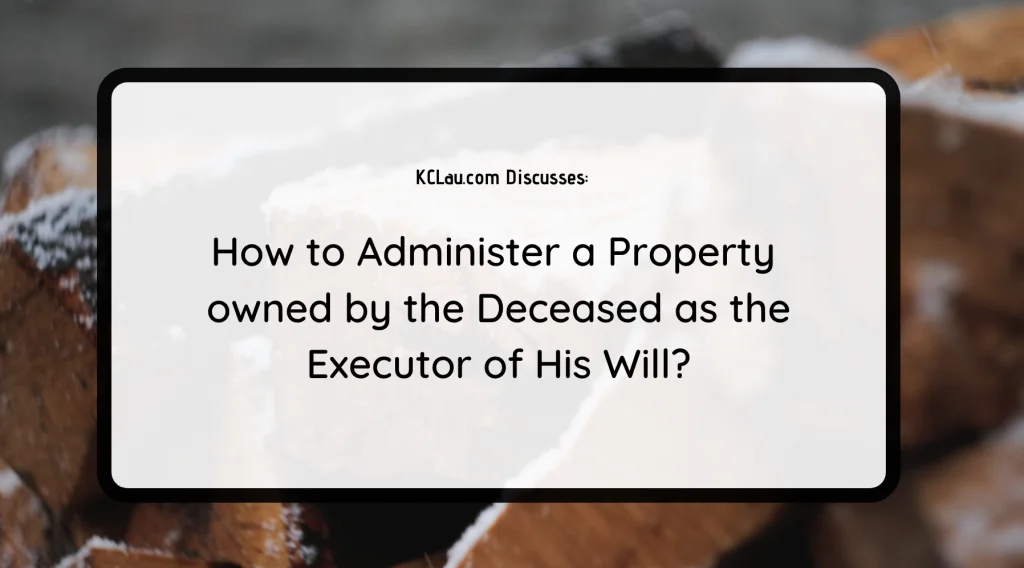Question:
Hi, my name is Bob. Lately, I received a call from Bill, my elder brother. From our conversation, Bill mentioned that he is writing a will where he intends to sell off his shoplot in Ipoh and distribute the sale proceeds to his daughters namely, Lee Min, Lee Lee, and Lee Peng. Lee Min is residing in London while Lee Lee and Lee Peng are residing in Australia currently. Bill’s wife had passed on four years ago. Bill wishes to appoint me as the executor of his will. Thus, my question is –
‘How should I administer the shoplot as the executor of Bill’s will?’
Answer:
Imagine. Let’s assume Bill has passed on and you are the executor of his will. As such, how you will administer the property shall be dependent on the following situations:
#1: Outstanding Mortgage on Bill’s Shoplot
Is the shoplot a fully paid property? Or, does Bill have an outstanding mortgage on his shoplot? And, if Bill has an outstanding mortgage on it, has he purchased a MRTA policy to cover his debts in the event of his passing?
For instance, let’s say, Bill owes about RM 500,000 in outstanding mortgages on his shoplot and his installment on it is RM 5,500 per month. If Bill’s MRTA policy is sufficient to cover all outstanding mortgages, the shoplot shall be a fully paid property upon his death. But, if Bill is underinsured, let’s say, his MRTA policy at the point of his death covers only RM 200,000, then, there shall be RM 300,000 of outstanding mortgages on Bill’s shoplot.
In this case, what is his plan to service the installments of RM 5,500 a month?
Is Bill receiving rent from his shoplot? Is it enough to pay the installments?
Will Bill leave behind cash that you can use to service the installments?
Is Bill willing to buy an insurance policy and assign it to you?
This is because, if there are outstanding mortgages on the property and Bill had failed to prepare a sum of money to cover the shortfall, the question is, ‘Would you be the one footing in the bill for Bill’s property?’
If let’s say, you are unable to do so, you could be forced to sell off Bill’s property quickly and thus, dispose of it at a discounted price. Worse, if you have failed to sell it off, you could be blacklisted by the bank and Bill’s shoplot would be taken back by the bank and be auctioned off.
But, if let’s say, you had decided to cover the shortfall. Then, after several years of footing in the bill, you had successfully disposed off the property. Hence, the next questions are:
Would you offset all of the amounts you had contributed from its sale proceeds when distributing it to your nieces namely, Lee Min, Lee Lee, and Lee Peng?
Would your three nieces be agreeable to it?
#2: When to Dispose Bill’s Shoplot?
Will Bill state when is his preferred time to sell off his shoplot in his will? Would the sale be immediate upon the ownership transfer of the shoplot to you as the executor of Bill’s will? Or, would the sale only be taking place after 5 years upon the ownership transfer?
Are there any differences between selling off Bill’s property immediately and to sell it off only after 5 years of holding onto it?
Yes, there are. Let me illustrate.
Let’s say, Bill’s property is valued at RM 2 million on 1 June 2021, which is when Bill passes on. In his will, Bill had stated his intention to immediately sell off the property upon his death. You, as the executor, have received its ownership on 1 December 2021 and subsequently, have disposed of for RM 2.5 million, netted from all allowable expenses for this transaction, on 1 January 2022.
Let’s also assume that Bill’s shoplot is currently tenanted and is earning positive cash flow. Thus, as the executor, you will be obligated to:
a. File in Bill’s income tax under Form TP for year assessment (YA) 2020.
b. Pay Real Property Gain Tax (RPGT) of RM 135,000. Its calculation is tabulated as follows:

But, if Bill stated in his will to only sell off the shoplot after 5 years the executor held onto it and you, as the executor, had received positive cash flows from the shoplot and subsequently, had it disposed of at RM 2.5 million on 11 July 2027. As such, you, as the executor, shall be obligated to:
a. File in Bill’s income tax under Form TP for YA 2020-2027.
b. Pay RPGT of RM 22,500. Its calculation is tabulated as follows:

Conclusion: Should You be the Executor of Bill’s Will?
If I’m Bob, before I say yes to be Bill’s executor, I would need to understand that the job of an executor is not simple for it requires me to be knowledgeable and that includes the knowledge on taxes, both income tax and RPGT. In addition, it can be a long-term commitment as the job of an executor could span years and even decades starting from the death of the testator (Bill).
Hence, if I’m not ready to take on this responsibility, I reckon Bill to consider an appointment of a corporate executor to write and execute his will for it is more practical. Here, if you happen to be Bill today and would like to find out more in detail about what you can do best for your estates, you can book yourself a 30- minute free consultation with our professional estate planners by first filling up the details below:




